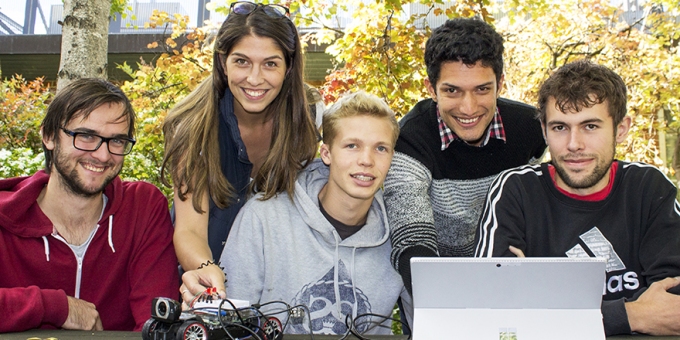The next generation of tech entrepreneurs presented their projects to potential investors and industry partners at a showcase held on Tuesday 9 May.
From robots that race athletes to apps that help individuals overcome a fear of flying, the projects on display were the result of a semesters work for 240 engineering and computing students from the ANU College of Engineering and Computer Science TechLauncher program.
Within the TechLauncher program, over 40 teams of four to 10 students work on a broad range of projects for a client, including our students own start-up ideas as well as industry projects.
Industry engagement in the program is increasing annually, and partners in 2017 included the Australian Institute of Sport, Canberra Hospital, World Photo Day, NuCoria and Canberra Counselling Services.
One group of students were delighted to present their project, Track RabBot, to the Australian Institute of Sport. They’ve been working to develop a solution to help Australian athletes train to beat the best in the world.
“We’re developing a portable robot that works its way around track at a programmed speed, allowing athletes to race against the robot,” said engineering student Imogen Blanch
“For example, you can program Usain Bolt’s world-record holding times for our athletes to race against. The robot also has video capability, so athletes are able to watch back their performance.”
TechLauncher is an ANU initiative and a collaborative effort with the ACT Government and the Canberra Innovation Network which enables students to develop the research and professional skills required to use technology to bring great ideas to life, and have a positive impact on society.
“The program is unique in that it is multi-disciplinary, unconstrained in terms of project and approach, allows students to work on their own start-up ideas, and is deeply integrated with local business and the start-up eco-system” says Dr Shayne Flint, Course Convenor of the TechLauncher program.
“The showcase is a great way to engage with students, learn about their capstone software and hardware projects, and network with the Canberra innovation community.”

